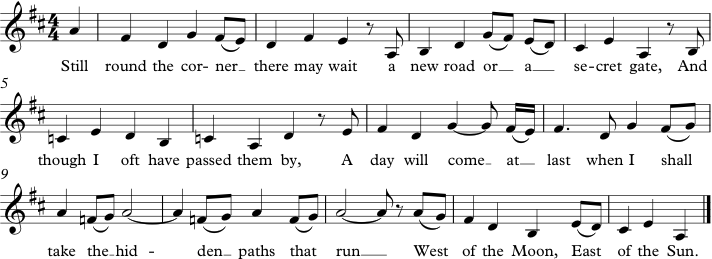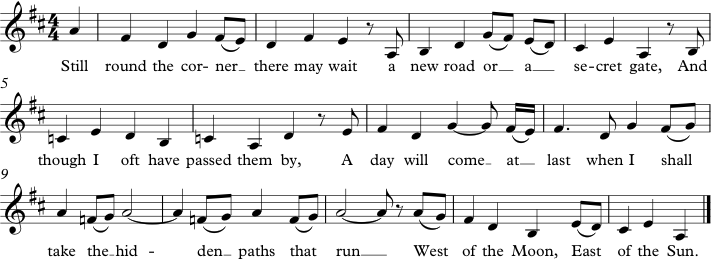Tolkien Ensemble, A Walking Song (I), TE CD 1, Track 4, 2:49.
Tolkien Ensemble, A Walking Song (II), TE CD 4, Track 16, 1:38.
Howard Shore, The Sacrifice of Faramir, LotR RotK CD 2, Track 4, 4:08, from 2:35.
Tolkien Ensemble, A Walking Song (II), TE CD 4, Track 16, 1:38.
Howard Shore, The Sacrifice of Faramir, LotR RotK CD 2, Track 4, 4:08, from 2:35.
On the way to Buckland, the Hobbits sing yet another walking song. The words are again attributed to Bilbo, but to “a tune that was as old as the hills” (LotR, 77). The text only speaks of the Hobbits humming the song, not actually singing it. Maybe the tune was very well known, but to a different text, which only Frodo knew. He could have started singing it and, after realising that the others sang different lyrics or just hummed along, followed their lead. When writing the Red Book, he then wrote down the words.
Upon the hearth the fire is red,
Beneath the roof there is a bed;
But not yet weary are our feet,
Still around the corner we may meet
A sudden standing stone
That none have seen but we alone.
Tree and flower and leaf and grass,
Let them pass! Let them pass!
Hill and water under sky,
Pass them by! Pass them by!
Still around the corner there may wait
A new road or a secret gate,
And though we pass them by today,
Tomorrow we may come this way
And take the hidden paths that run,
Towards the Moon or to the Sun.
Apple, thorn and nut and sloe
Let them go! Let them go!
Sand and stone and pool and dell,
Fare you well! Fare you well!
Beneath the roof there is a bed;
But not yet weary are our feet,
Still around the corner we may meet
A sudden standing stone
That none have seen but we alone.
Tree and flower and leaf and grass,
Let them pass! Let them pass!
Hill and water under sky,
Pass them by! Pass them by!
Still around the corner there may wait
A new road or a secret gate,
And though we pass them by today,
Tomorrow we may come this way
And take the hidden paths that run,
Towards the Moon or to the Sun.
Apple, thorn and nut and sloe
Let them go! Let them go!
Sand and stone and pool and dell,
Fare you well! Fare you well!
Home is behind, the world ahead,
And there are many paths to tread
Through shadows to the edge of night,
Until the stars are all alight.
Then world behind and home ahead,
We'll wander back to home and bed.
Mist and twilight, cloud and shade,
Away shall fade! Away shall fade!
Fire and lamp, and meat and bread,
And to bed! And then to bed!
(LotR, 77)
And there are many paths to tread
Through shadows to the edge of night,
Until the stars are all alight.
Then world behind and home ahead,
We'll wander back to home and bed.
Mist and twilight, cloud and shade,
Away shall fade! Away shall fade!
Fire and lamp, and meat and bread,
And to bed! And then to bed!
(LotR, 77)
http://soundcloud.com/middle-earth-music/4-1-6-a-walking-song-i/s-nHEIr
The version by the Tolkien Ensemble is a folk song, heavily influenced by English Folk music and, once again, very catchy. The line-up consists of plucked bass, rhythm guitar, mandolin, accordion and fiddle. While in the context of the book this performance would not be realistic, this version fits very well with the stylistic assumptions we made when discussing Hobbit music: It has a striking similarity to Traditional Folk and indeed includes a mandolin, an instrument likely played by Hobbits. We can take this song as one example where the Ensemble strived to capture the general sound of the kind of music Hobbits liked: Happy, exuberating songs about everyday life. Other songs from the category, also similarly set to music by the Ensemble are the Bath Song, the Drinking Song and There is an Inn, an adaption of which for the stage show we will look at later (see 4.2.1).
The choice for using this particular song as an example for Hobbit music was the significance of the song in the book: The second verse of the song is sung a second time to the same setting by Frodo, but with a slightly different text he supposedly made up himself and much slower, immediately before leaving to the Grey Havens (LotR, 1028):
transcription (excerpt, first part): A Walking Song (II), TE CD 4, Track 16.
http://soundcloud.com/middle-earth-music/4-1-6-a-walking-song-ii/s-E71KM
The verse refers to the Straight Road, the way to Aman open only to the Elves as a grace of the Valar. Few mortals were allowed to take it, including Bilbo, Frodo and Sam. Sam would only depart years after Frodo, but because he, too, was a ring-bearer, he was granted the passage. For Frodo to sing this song (and not one of the numerous walking songs known to Hobbits with some of them most certainly written by Bilbo) serves as a retrospective of how his quest started: When he sang the song on the way to Buckland, his group was a part of what later would become the Fellowship. Now that he is leaving, the process is reversed: The other three Hobbits are staying, he leaves.
This version of the song is accompanied only by guitar and mirrors the events of the book: When Frodo has finished his stanza (0:46), a soprano comes in with the beginning of the Hymn to Elbereth Gilthoniel (see 4.1.7). Frodo is singing slowly, reminiscing how his quest started and knowing that his last journey would now begin.
If we go back to our findings of the subject matters the music of Hobbits largely dealt with, we will remember Pippin being asked by Denethor to sing him a song. Pippin apologised to his master that he did not think there were any songs befitting “great halls and evil times” (LotR, 806) and in the book, he is spared the ordeal and does not have to sing any song. In the film he is less fortunate and required to sing a song. He then sings some lines from the Walking Song adapted by Philippa Boyens:
Home is behind.
The world ahead,
And there are many paths to tread
Through shadow to the edge of night
Until the stars are all alight
Mist and shadows, cloud and shade.
All shall fade.
All shall fade.
(Adams, 300).
The piece is called The Edge of Night in the film (Adams, 300) and initially sung without accompaniment by Pippin. Adams describes its use in the film: “Gently, the orchestra enters, building tearing dissonances behind Pippin’s simple Hobbit tune. [. . .] The Orcs release their first volley of arrows, and the orchestra suddenly cuts off, abandoning Pippin to finish his final syllable alone” (Adams, 300). In the film, the simple Hobbit travel tune is given a new meaning: The soldiers, sent to their doom on a suicide mission by the deranged steward, are far from home, too, just like the Hobbits the song was originally sung by. The original song speaks of mist and cloud as undesirable, albeit natural and perfectly normal phenomena on the road fading away to make room for a cosy home and a nice, warm bed:
Mist and twilight, cloud and shade,
Away shall fade! Away shall fade!
Fire and lamp, and meat and bread,
And to bed! And then to bed!
Pippin’s rendition from the movie has a slightly changed wording and instead interprets the mist and clouds as the fear, pain and anger of the last few minutes of the soldiers’ lifes:
Mist and shadows, cloud and shade.
All shall fade.
All shall fade.
The simple life of a Hobbit expressed by this easy to remember melody clashes with the big battles ordered by people greedy for power (Sauron and the orcs sent by him) or with a broken mind due to the sheer pressure of their knowledge (Denethor with his Palantír). One should also note the replacement of “twilight” from the song in the book with “shadow” in the film (printed bold above). The “shadow” most likely refers to the shadow of death looming over the soldiers, not to the natural shadow created by the “twilight” from the poem. In the movie, all the soldiers are well aware that they were riding never to return, which is what Pippin’s song expresses: They are riding into the shadow, into their death, which happens when “the stars are all alight” – the Orcs attack at night. Lastly, the way this change in meaning between the two versions of the same song is brought forth is by altering just one word: “Away” becomes “All” (again printed bold), which at that time is more than fitting. Not only is the life of the soldiers about to fade, but also the hope for Minas Tirith and the whole civilised world. We learn that Denethor secretly has a Palantír, one of the ancient Seeing Stones, with whose help Sauron was able to influence him and destroy his sanity. The song foreshadows this development and suggests that all hope is lost.


